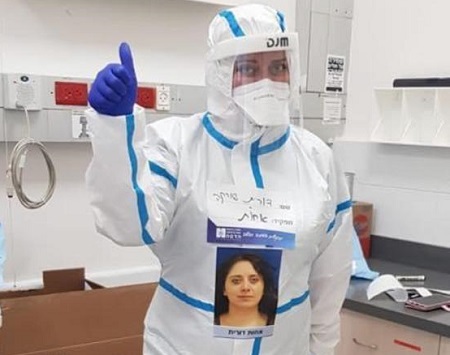
Dorit Shorokeh Heals COVID-19 Patients.

Managing two of Hadassah Hospital Ein Kerem’s COVID-19 outbreak units is head nurse Dorit Shorokeh, who normally heads nursing services for the urological and orthopedic departments. In the two outbreak units, she is responsible for the health of 38 patients who have tested positive for COVID-19 and for the nurses who care for them.
“It’s like biological warfare,” she says. “We’re learning as we go along, getting better all the time. What unites us is that we all want to work here, to do whatever we can for our patients.”
As Shorokeh participated in this interview, she had two women in labor and two additional COVID-19 patients about to give birth.
When Shorokeh needs support, she turns to the managers of the hospital, who, she says, are 100 percent behind her. On the home front, she can turn to husband Ran. They decided early in the crisis that Dorit’s work was more important, so he reduced his work hours in order to look after their boys, Beniyah, 9, and Oriel, 5.
“They understand that we’re in a biological war,” she says. “They know their mother has to help the patients, that she wants to do it, and is happy doing it.”
Naela Hayek Ensures Adequate Staffing.

In addition to her usual heavy responsibilities as nursing supervisor of Hadassah Ein Kerem’s intensive care, emergency room, cardiology, and cardiology ICUs, Naela Hayek now has the challenge of making sure the separate COVID-19 outbreak units are constantly staffed. And she has to be prepared for an unknown future.
She’s aided by the decision of HMO Director-General Prof. Zeev Rotstein to test all staff members every five days so that nurses who have been exposed to the virus don’t have to quarantine if they test negative.
“We’ve already trained nurses who previously attended advanced courses in intensive care and trauma but no longer work in those departments,” says Hayek. “We’re beginning to integrate nurses who’ve not been through these courses in the outbreak unit.”
In addition, because she is connected with nurses throughout the region as the co-founder of Nurses of the Middle East, an NGO started by Hadassah nurses to coordinate care for Palestinian patients treated at Hadassah once they return home, she fields many requests from nurses outside of Israel.
“For example, just today a nurse in Gaza asked if there’s a way we can help her obtain chemotherapy drugs that a patient needs,” she said
Hayek couldn’t be prouder of her team, who are working day and night. “Hadassah nurses know they have a mission, which isn’t something we take for granted,” she says. “Working here is far more than a job.”
Hayek longs to see her three children and her grandson, Joseph. Her husband, Aied, is also putting in extra hours as a police officer, but Hayek says they get to spend some quality time together in the late evenings.
“We see ourselves as the lucky ones. We have tough but meaningful jobs and never feel helpless in this international battle to save lives.”
Pnina Sharon Puts Preparedness Training to Immediate Use.

When Pnina Sharon took over responsibility for the Hadassah Medical Organization’s nursing response to emergencies a year ago, little did she realize she would be dealing with the largest medical crisis in the country’s history.
“We’re facing what one can only describe as a type of biological attack,” Sharon says. “It’s as if you’ve walked into a shopping mall where someone sprayed a biological agent. It doesn’t matter if it started in China or in a mall. From a crisis-management point of view, it’s the same thing.”
Sharon works closely with Hadassah Ein Kerem Deputy Director Dr. Inon Buda planning for emergency situations, including mass-casualty incidents, toxic pollution, radiation, and chemical warfare. Over the last year, they updated and wrote protocols, trained staff, and built emergency teams so that the hospital would be ready for the swift admission of hundreds of patients.
“That said, I never dreamed for a second it would all be needed,” she says. “The Health Ministry gave us advance notice that we’d be doing a biological-disaster training exercise this November, and we started reviewing the recommended procedures. Who would have thought that we would enter this reality with its rapidly changing demands?”
The hospital’s first responsibility is to protect its staff. That means ensuring they know correct working procedures, have protective equipment and can guarantee safe admission and treatment of patients.
During the current crisis, staff from other departments have been shifted to critical areas. New training programs have been added, says Sharon. Transferred staff members need to know how to operate respirators, deal with patients with multiple illnesses, and gain knowledge from the invaluable experience of colleagues already working in the COVID-19 outbreak units.
Doctors and nurses also need to be prepared for the psychological impact on patients who cannot have visitors. “We’re trying to support the families,” says Sharon. “We’re phoning to keep them updated. We’re giving out our own cellphone numbers. They can speak to our social workers. We’re using whatever technologies are out there to enable them to ‘spend time’ with their loved ones.”
At the end of her 12-hour working day, Sharon gets a warm welcome from husband Moshe, a dentist, and lawyer. “I haven’t seen my three adult children in several weeks,” Sharon explains. “Every night I read a bedtime story to our six grandchildren. They like it and so do I.”
